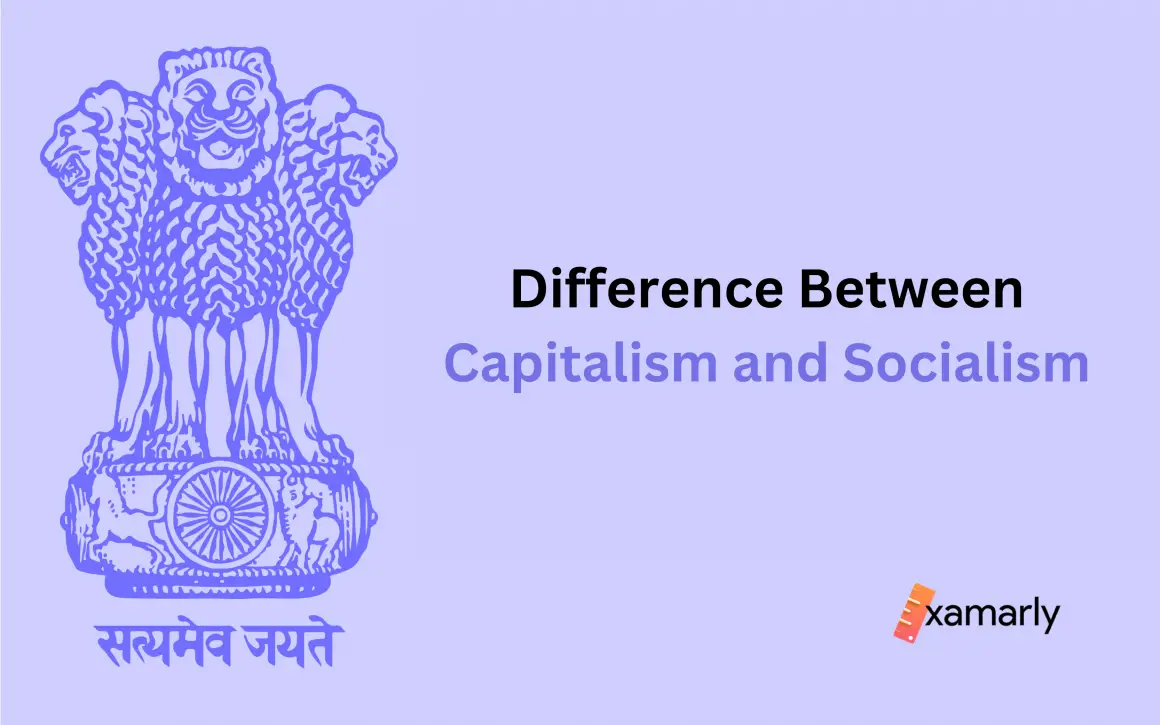An Overview
- An Overview
- What is Capitalism?
- History Of Capitalism
- Importance Of Capitalism
- Merits of Capitalism
- What is Socialism?
- What is The Difference Between Capitalism and Socialism?
- Summing Up
- FAQs
- Q: What is capitalism?
- Q: What is socialism?
- Q: How do capitalism and socialism differ in terms of government involvement in the economy?
- Q: How do capitalism and socialism differ in terms of the distribution of wealth?
- Q: Can a country have a mix of capitalism and socialism?
- Q: Are there any successful examples of socialism in the world?
Capitalism and Socialism are two different economic systems. Before getting the difference between Capitalism and Socialism let us understand both of these concepts solely to begin with.
Capitalism is characterized by private ownership of the means of production and the creation of goods and services for profit. Under capitalism, the market is the driving force of the economy, and prices are determined by supply and demand. Socialism, on the other hand, is characterized by collective or government ownership of the means of production and a focus on meeting the needs of all members of society. In a socialist economy, the government plays a larger role in controlling the economy and redistributing wealth.
We will cover every important aspect related to both concepts and will reflect on the elaborative differences between them.
You Might Also Like – Difference Between Absolute And Relative Poverty
What is Capitalism?
Most people think of capitalism as an economic system in which private actors own and control property according to their interests and where prices in markets are determined by supply and demand.
Making a profit is important to the capitalist system. It is not from the generosity of the butcher, the brewer, or the baker that we expect our dinner, but from their respect to their own advantage, as Adam Smith, the 18th-century philosopher and father of modern economics, put it. Each side in a voluntary trade deal has something at stake, yet neither can get what they want unless they also consider the other’s needs. Prosperity in the economy may result from people acting in their own self-interest.
Capital assets, such as factories, mines, and railroads, can be privately owned and controlled in a capitalist economy; labour is purchased for monetary wages; capital gains accrue to private owners; and capital and labour are allocated between competing uses based on market prices (for more on this, see “Supply and Demand” in the June 2010 issue of the Food & Drug Administration’s F&D).
Although capitalism in one form or another forms the backbone of most economies today, it was only one of two dominant economic models for much of the 20th century. In socialism, on the other hand, the state owns the means of production and ensures that publicly owned businesses prioritise social benefit over profit.
History Of Capitalism
There were capitalist institutions in the ancient world and thriving pockets of capitalism in Europe during the late Middle Ages, but capitalism as a system didn’t begin to take shape until the 16th century. The expansion of the English textile industry in the late 16th, early 17th, and early 18th centuries was a major driving force in the emergence of capitalism. The development that set capitalism apart from other systems was the preference for investing surplus capital in expanding productive capacity rather than in economically inefficient endeavours like the construction of pyramids and cathedrals. Numerous incidents in the past bolstered this trait.
The customary scorn for the acquisitive endeavour was decreased in the ethic promoted by the Protestant Reformation of the 16th century, and hard work and frugality were given a deeper theological sanction. Because the wealthy are more moral than the poor, economic disparity was seen as acceptable.
The rising availability of precious metals in Europe also contributed to the rise in pricing. Inflation benefited capitalists at the expense of workers during this time since wages did not increase at the same rate as prices. During the mercantilist era, when early capitalism flourished (1500-1750), wealthy individuals reaped the benefits of consolidated national governments. National power policies implemented by these regimes helped establish the standard monetary systems and legal codes essential to economic growth, paving the way for the gradual transition from public to private sector initiative.
Importance Of Capitalism
- Since goods are manufactured in response to consumer demand, the capitalist economic system is more efficient.
- There is less bureaucratic red tape and governmental meddling.
- Greater room for experimentation is available as businesses aim to corner a sizable chunk of the market.
- Trade can take place between parties with no hindrances because of the prohibition of discrimination.
Merits of Capitalism
One of the defining features of capitalism is the right of individuals or businesses to own and use the means of production, such as buildings, machinery, and other capital assets.
Entrepreneurial freedom: in this model, people are free to pursue their own economic goals without government interference. Both manufacturers and shoppers can benefit from this.
One of the primary forces propelling a capitalist economy is the desire to maximise one’s personal financial gain. Companies in this system compete to manufacture and sell goods to consumers in order to maximise profits.
Market forces of supply and demand, unfettered by government interference, would decide the quantity of production and the prices at which goods would be sold under this price mechanism.
In this economic model, consumers exercise absolute power over market prices by setting consumer preferences. Companies’ manufacturing efforts are limited hence, while consumers retain agency in their purchasing decisions.
Free trade is a system in which tariffs are kept to a minimum to facilitate trade between countries.
Interference from the government: In a free market economy, the government stays out of the way of businesses as they go about their regular operations. Both consumers and manufacturers are unrestricted in their choice of action.
Worker hiring and firing can be done more freely in capitalist economies.
To possess and utilise as much property as one wants is a fundamental right in this system. When he passes away, his heirs will inherit the same property.
What is Socialism?
Socialism is an economic and political ideology that advocates for the collective ownership and control of the means of production and distribution of goods and services. The goal of socialism is to create a more equal and fair society by reducing economic inequality and ensuring that the benefits of economic growth are shared by all members of society.
Socialism has been implemented in various forms in countries around the world, including in the form of social democracy in countries like Sweden, and in the form of state socialism in countries like the former Soviet Union. In a socialist system, the government is typically responsible for planning and directing the economy, and may also provide universal access to certain goods and services such as healthcare and education.
One of the main criticisms of socialism is that it can lead to a lack of economic efficiency and innovation, as the government rather than the market, make key economic decisions. Another critique is that socialism can lead to a lack of political freedom, as the government may exert a great deal of control over citizens’ lives.
However, supporters of socialism argue that it is necessary to address the inequalities created by capitalism and that it can provide a more equitable and sustainable economic system.
It is worth noting that socialism has different variations and interpretations, and the specific characteristics and implications of socialism can vary depending on the specific system and context in which it is implemented.
History Of Socialism
Although it has roots in earlier movements and concepts, socialism began with the 1789 French Revolution and subsequent changes. Karl Marx and Friedrich Engels wrote the Communist Manifesto in 1847–48, advocating scientific socialism, before the 1848 Revolutions. In the last third of the 19th century, European democratic socialist parties drew from Marxism.
In the first half of the 20th century, the Soviet Union and Third International communist parties around the world mostly represented socialism in terms of the Soviet model of economic development and the creation of centrally planned economies run by a state that owns all the means of production, even though other movements criticized the lack of democracy. Herbert Morrison said that the Labour government in the UK brings about socialism. Aneurin Bevan, on the other hand, said that an economic plan and workers’ democracy put “major streams of economic activity under public supervision.” Some claimed that capitalism had come to an end. Socialist administrations created a mixed economy with partial nationalisations and social welfare.
The New Left, socialists hostile to the Soviet Union and social democracy, emerged in 1968 after the Vietnam War. Cooperatives or workers’ councils were favoured by anarcho-syndicalists and some New Left members. Socialists also support feminism, environmentalism, and progress. The pink tide of the early 21st century in Latin America promoted 21st-century socialism, including the nationalisation of significant national assets, anti-imperialism, left-wing populism, and rejection of the Washington Consensus and neoliberalism. President Hugo Chávez started it.
Importance Of Socialism
Socialism is important because it aims to create a more equal and fair society by addressing the issue of economic inequality. It advocates for the collective ownership and control of the means of production, which means that resources and industries that drive a society’s economy would be owned and controlled by the community or the state rather than by private individuals or corporations. This leads to a more equal distribution of wealth and resources and eliminates the exploitation of workers by capitalists.
Additionally, socialism emphasizes the role of the government in ensuring that the needs of all citizens are met, rather than just the wealthy or powerful. This can lead to more efficient use of resources and services, as decisions would be made based on the needs of society as a whole. Furthermore, socialism promotes social and economic justice, as it gives more power to the working class and ensures that their rights and well-being are protected. In summary, socialism is important because it addresses economic inequality, promotes social and economic justice, and ensures that the government serves the needs of all citizens.
What is The Difference Between Capitalism and Socialism?
Capitalism and socialism are two different economic systems. Capitalism is based on the idea of private ownership of the means of production and the creation of goods and services for profit. Under capitalism, the market is the primary means of allocation of resources and economic activity is driven by the profit motive. In contrast, socialism is based on the idea of collective ownership of the means of production and the distribution of goods and services according to need. Under socialism, the government plays a larger role in the economy, and economic activity is often planned and managed by the state.
One of the main differences between capitalism and socialism is the role of the government. In a capitalist system, the government’s job is to make and enforce laws that encourage competition and protect private property rights. Other than that, the government doesn’t have much of an effect on the economy. In a socialist system, the government has a bigger role in the economy and may own and run certain industries, such as healthcare, education, and transportation.
Another difference is in the distribution of wealth. Under capitalism, the distribution of wealth is determined by the market, and individuals and businesses are free to accumulate wealth through their own efforts. Under socialism, the government may redistribute wealth through progressive taxation and welfare programs to promote greater economic equality.
In capitalism, the economy is driven by private enterprise and competition while under socialism, the economy is planned and controlled by the state.
Summing Up
In summary, capitalism is an economic system that emphasizes individual ownership and market-driven decisions, while socialism is an economic system that emphasizes collective ownership and government control over economic decisions.
FAQs
Q: What is capitalism?
A: Capitalism is an economic system based on private ownership of the means of production, a market-driven economy, and the pursuit of profit. Under capitalism, individuals and businesses are free to accumulate wealth through their own efforts and the market determines the distribution of goods and services.
Q: What is socialism?
A: Socialism is an economic system based on collective ownership of the means of production, government control of the economy, and an emphasis on economic equality. Under socialism, the government plays a larger role in managing the economy and redistributing wealth through progressive taxation and welfare programs.
Q: How do capitalism and socialism differ in terms of government involvement in the economy?
A: In a capitalist system, the government’s role is limited to protecting private property rights and promoting competition, while in a socialist system, the government plays a larger role in managing the economy and redistributing wealth.
Q: How do capitalism and socialism differ in terms of the distribution of wealth?
A: Under capitalism, the distribution of wealth is determined by the market, and individuals and businesses are free to accumulate wealth through their own efforts. Under socialism, the government may redistribute wealth through progressive taxation and welfare programs to promote greater economic equality.
Q: Can a country have a mix of capitalism and socialism?
A: Many countries have economic systems that combine elements of both capitalism and socialism. These are often referred to as mixed economies.
Q: Are there any successful examples of socialism in the world?
A: Some countries, such as Sweden and Denmark, have implemented socialist policies and have had relatively high levels of economic growth and social welfare. However, it’s important to note that the term socialism is often used differently in different countries and different political contexts.






